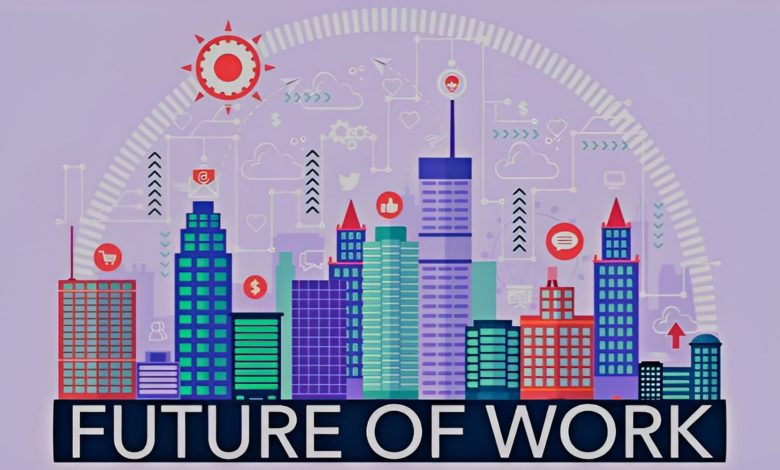The Future of Work: Trends and Predictions for Your Career

The world of work is undergoing a profound transformation. Technology, social changes, and global events are reshaping how we approach our careers. To thrive in this evolving landscape, it’s essential to understand the trends and predictions that will shape the future of work. In this blog post, we’ll explore key aspects of the future of work and provide insights to help you navigate your career in this dynamic environment.
1. Automation and Artificial Intelligence
The Rise of Automation
Automation has been a topic of discussion for years, but its impact is becoming increasingly visible across various industries. As technology advances, more tasks are being automated, from manufacturing and logistics to data analysis and customer service. This trend will continue to reshape the job market, with some roles being replaced by machines.
The Role of AI
Artificial Intelligence (AI) plays a pivotal role in automation. While AI has the potential to displace certain jobs, it also augments others. AI-powered tools can enhance decision-making, automate routine tasks, and provide valuable insights. To stay competitive, consider how AI can complement your skill set and make you more efficient in your role.
Preparing for AI-Driven Changes
To prepare for AI-driven changes, focus on developing skills that are less susceptible to automation. Soft skills like creativity, emotional intelligence, and critical thinking are highly valuable in an AI-driven world. Additionally, continuous learning and staying updated on AI developments within your industry will be crucial for career longevity.
2. Remote Work and Hybrid Models
The Growth of Remote Work
Remote work has experienced unprecedented growth, driven by advances in technology and the need for flexibility. Many organizations are adopting remote work as a long-term strategy. This shift provides opportunities for a more balanced work-life integration and access to a global job market.
Benefits and Challenges of Remote Work
While remote work offers numerous benefits, such as reduced commute times and increased flexibility, it also presents challenges. Maintaining work-life boundaries, combating isolation, and effective communication in virtual environments can be hurdles to overcome. Being aware of these challenges and developing strategies to address them is essential for success.
Thriving in Remote and Hybrid Environments
To thrive in remote or hybrid work environments, cultivate strong time management skills, establish a dedicated workspace, and prioritize effective communication. Stay connected with colleagues through regular virtual meetings and embrace digital collaboration tools. Adaptability and a proactive approach to remote work are key to thriving in this new paradigm.
3. Gig Economy and Freelancing
The Gig Economy’s Impact
The gig economy, characterized by short-term contracts and freelance work, is reshaping traditional employment. Companies are increasingly relying on freelancers and independent contractors to access specialized skills without the commitment of hiring full-time employees. This trend provides opportunities for flexible and varied work arrangements.
Freelancing as a Career Choice
Freelancing offers autonomy and the chance to pursue your passions. However, it also comes with the responsibility of managing your own business, including finances and marketing. If you choose freelancing as a career, invest in building your brand, setting competitive rates, and continuously upgrading your skills to remain competitive.
Strategies for Success
To succeed in the gig economy, network actively, build a strong online presence, and diversify your client base. Freelancers often face income variability, so financial planning and a robust support network are essential. Leveraging platforms like Upwork, Fiverr, or Freelancer can help you access a global client base and secure consistent work.
4. Skills of the Future
In-Demand Skills
The skills demanded by the job market are evolving. While technical skills remain valuable, soft skills such as adaptability, emotional intelligence, and critical thinking are increasingly sought after. Additionally, digital literacy and the ability to work with data and automation tools are becoming essential in various industries.
The Importance of Adaptability
The pace of technological change means that the skills needed for tomorrow’s jobs may not exist today. Therefore, adaptability and a commitment to lifelong learning are crucial. Seek out opportunities for skill development, whether through online courses, workshops, or mentorship programs. Being agile in your skill set will make you more resilient to changes in the job market.
Acquiring Future-Ready Skills
Consider pursuing certifications or degrees that align with emerging industries and technologies. For example, fields like artificial intelligence, data science, and renewable energy offer promising career prospects. Online platforms, such as Coursera, edX, and LinkedIn Learning, provide accessible options for upskilling and reskilling.
5. Diversity, Inclusion, and Remote Teams
Building Diverse and Inclusive Remote Teams
Remote work has the potential to increase diversity in the workforce by eliminating geographical constraints. Organizations are increasingly focused on creating inclusive remote environments. Actively seek diverse talent, implement inclusive policies, and promote a culture of belonging to ensure a diverse and inclusive remote team.
Addressing Remote Team Challenges
Managing remote teams comes with unique challenges, including time zone differences and cultural diversity. Effective communication and collaboration tools are critical to overcoming these challenges. Encourage open dialogue, set clear expectations, and promote a culture of mutual respect within your remote team.
Leveraging Diversity for Innovation
Diverse teams bring varied perspectives, which can lead to enhanced creativity and problem-solving. Embrace diversity as a source of innovation and a competitive advantage in the remote work landscape. Encourage diverse team members to share their unique insights and experiences.
6. Mental Health and Well-being
The Significance of Mental Health
The well-being of employees is a growing concern in the future of work. Remote work can blur the boundaries between work and personal life, leading to stress and burnout. Mental health should be a priority for both employees and employers.
Coping with Remote Work-Related Stressors
To manage remote work-related stressors, establish a structured routine, take regular breaks, and practice mindfulness. Reach out to colleagues and friends for social interactions, even if they are virtual. Be proactive in seeking support when needed, whether through Employee Assistance Programs (EAPs) or mental health professionals.
Strategies for Maintaining Mental Well-being
Maintaining mental well-being requires self-awareness and self-care. Prioritize self-care activities like exercise, meditation, and hobbies. Set boundaries on work hours and disconnect from digital devices when the workday ends. By actively managing your mental health, you’ll be better equipped to excel in your career.
7. The Future of Education and Training
Innovations in Education and Training
The future of work also affects how we acquire knowledge and skills. Innovations in education, such as online courses, micro-credentials, and virtual reality-based training, are transforming traditional learning models. These innovations offer flexible and accessible opportunities for career development.
Lifelong Learning
Lifelong learning is no longer a choice but a necessity in the ever-changing job landscape. Take advantage of online learning platforms to acquire new skills and stay updated in your field. Consider pursuing micro-credentials or enrolling in short courses that align with your career goals.
Navigating Educational Opportunities
When evaluating educational opportunities, consider your career goals and the skills in demand in your industry. Seek guidance from career counselors or mentors to make informed decisions. Explore options like Massive Open Online Courses (MOOCs), bootcamps, and industry-specific certifications to enhance your skill set.
8. Environmental and Ethical Considerations
The Role of Sustainability and Ethics
Environmental sustainability and ethical considerations are gaining prominence in career decisions. Green careers focused on sustainability and environmental conservation, are on the rise. Likewise, socially responsible organizations are attracting individuals who align with their ethical values.
Green Careers and Social Responsibility
If environmental sustainability is a priority, explore green careers in renewable energy, conservation, or sustainable agriculture. Research organizations that align with your ethical values and consider working for or supporting companies with a strong social responsibility agenda.
Balancing Personal Values with Career Decisions
As you navigate your career, strike a balance between personal values and professional growth. Reflect on what matters most to you, whether it’s environmental conservation, social justice, or ethical business practices. Aligning your career choices with your values can lead to greater job satisfaction and purpose.
Conclusion
The future of work is filled with opportunities and challenges. Embrace the changes brought by automation and artificial intelligence, explore the possibilities of remote and gig work, and invest in future-ready skills. Foster diversity, prioritize mental health and adapt to evolving education and training methods. Ultimately, align your career with your values, and you’ll be well-prepared to thrive in the dynamic landscape of the future of work.





